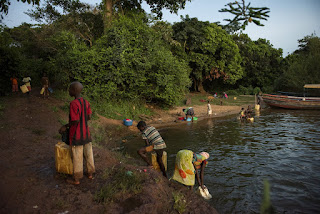Introduction : clean water
2019, Gwagwalada Area Council, Nigeria.
My colleagues and I woke up in Abuja, the capital city of Nigeria. Soon, we are heading to a village in the countryside. Although the two sites are one hour away by the road, the differences between the city and the villages were striking, in terms of wealth, infrastructures, but above all, in terms of water access.
In the city, no problem : we could go and buy bottled water without much difficulties. But we soon learned that it wasn't the case everywhere here in Nigeria. Inhabitants explained to us that in the village, as in still many villages, the main sources of water were the rains, or the rivers.
The main source of water in many villages in Nigeria. (tmrwmagazine.com)
The problem here isn't about having an access to water. The problem is to have access to clean water so it can be used for basic needs such as drinking and cooking. Again, the inhabitants and even children that were out of school at the time showed us how they were using the water to clean their hands before going to class, or from where they were mainly getting the water because their resources in bottled water is either not sufficient, expensive, or always available. The issue is the following : the stream providing the water is the same for everything. Animals are drinking there, litter is all around, and kids are playing in it... and still, they are taking water from it for cooking or sanitation.
This case isn't isolated, as a third of Nigeria's population lack of clean water sources. Some people have to walk for miles before getting to the closest drilled community borehole. Some villages only have access to water once a week, and so on.
The consequences of such a lack of clean water are numerous : diseases, less time to focus on school, less time at work, poverty...
The consequences of such a lack of clean water are numerous : diseases, less time to focus on school, less time at work, poverty...
That's what brought us there, on this little village. A few days before the World Water Day talks, held in Nigeria, there is still a lack of state action to get a better distribution of clean water.
But this issue isn't only on Nigeria : Western Africa countries do have, indeed, large water resources, but the region is afflicted by chronic deficits caused by an unequal distribution of rainfall, and the weak exploitation and management of these resources.(WAWRP report)
The lack of clean water sources in Western Africa is, thus, about choices. But who make the choice? How are these choices driven? What are the stakes behind this unequal distribution?
The lack of clean water sources in Western Africa is, thus, about choices. But who make the choice? How are these choices driven? What are the stakes behind this unequal distribution?
Western Africa countries, the focus of my blog for this term. (123rf.fr)
We can then tell that in Western Africa, the clean water unequal distribution is caused by politic issues, which can be due to personal stakes, money issues, privatization of the water companies, or even corruption, as I will show in future posts.
My personal interest in the subject matter is mainly due to the fact I met through my high school and college years with people from this geographic area. Getting to know them, I learned about their countries issues, and that they were part of the lucky ones. This is why I decided to study these inequalities, and the politic hidden behind such issues.
On my blog, you will find cases analysis, countries comparisons in term of water management, but also posts about people who are trying to do something about these inequalities, whether being political persons, activists, organizations, or local people.
Enjoy your reading !
Enjoy your reading !



Commentaires
Enregistrer un commentaire